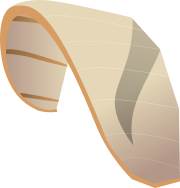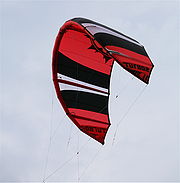
Bow kite
Encyclopedia


Leading edge inflatable kite
A leading edge inflatable kite or LEI is a single skin kite with inflatable bladders providing structure. It is useful as a power or traction kite. These kites are flown using 2, 4 or 5 control lines and a bar. A LEI is a great kite for water use because the inflated bladders cause it to float on...
s that incorporate a bridle on the leading edge. They can be identified by a flat, swept-back profile and concave trailing edge allowing the kite greater depower. Bow kite design was pioneered by Bruno Legaignoux, and have been licensed to many kite manufacturers.
Bow kites have a wider wind range than C-kites (traditional LEI kites
Leading edge inflatable kite
A leading edge inflatable kite or LEI is a single skin kite with inflatable bladders providing structure. It is useful as a power or traction kite. These kites are flown using 2, 4 or 5 control lines and a bar. A LEI is a great kite for water use because the inflated bladders cause it to float on...
), so two kite sizes (such 7m² and 12m²) could form an effective quiver for winds ranging from 10 to 30+ knots for a 75 kg rider. This makes bow kites more suitable for beginners to kite sports; however, they are also used by professionals.
Bow kites are used in a variety of kite related sports, including kitesurfing
Kitesurfing
Kitesurfing or Kiteboarding is an adventure surface water sport that has been described as combining wakeboarding, windsurfing, surfing, paragliding, and gymnastics into one extreme sport. Kitesurfing harnesses the power of the wind to propel a rider across the water on a small surfboard or a...
and snowkiting
Snowkiting
Snowkiting is an outdoor winter sport where people use kite power to glide on snow or ice. The sport is similar to kitesurfing, but with the footwear used in snowboarding or skiing. In the early days of snowkiting, foil kites were the most common type; nowadays some kitesurfers use their water gear...
. Because of their depower range, they allow users to combat problems caused by gusts, making them safer to use. They are also used by kite surfers
Kitesurfing
Kitesurfing or Kiteboarding is an adventure surface water sport that has been described as combining wakeboarding, windsurfing, surfing, paragliding, and gymnastics into one extreme sport. Kitesurfing harnesses the power of the wind to propel a rider across the water on a small surfboard or a...
for wave riding, as their unique shape lends itself to this discipline.
Early Kites
While early bow kites allowed kite to be fully depowerable, they had a number of disadvantages compared to classic C-KitesLeading edge inflatable kite
A leading edge inflatable kite or LEI is a single skin kite with inflatable bladders providing structure. It is useful as a power or traction kite. These kites are flown using 2, 4 or 5 control lines and a bar. A LEI is a great kite for water use because the inflated bladders cause it to float on...
. These included:
- They can get inverted and not fly properly
- They are a bit twitchy and not as stable
- They have heavier bar pressure, which makes them more tiring to fly
- They are more difficult to relaunch (except if they are on the leading edge).
- They lack a "sled boosting" effect when jumping (The jumps are higher and longer, but the technique for jumping is different).
Modern Bow Kites
In 2006, second generation flat LEI kites were developed which combine 100% depower and easy, safe relaunch with higher performance, less performance penalties and reduced bar pressure. The bridle and control bar design has later been refined to give a more direct feel and less bar pressure while small modifications to the kites themselves has provided more stable kites less likely to invert.Ongoing developments are bringing improvements to this style of kite every year and they are now extremely popular with riders of all abilities.
Safety
Although bow kites make kite flying safer, it is always advisable to seek professional training, as accidents can still occur.See also
- TJ Wade
- KitesurfingKitesurfingKitesurfing or Kiteboarding is an adventure surface water sport that has been described as combining wakeboarding, windsurfing, surfing, paragliding, and gymnastics into one extreme sport. Kitesurfing harnesses the power of the wind to propel a rider across the water on a small surfboard or a...
- SnowkitingSnowkitingSnowkiting is an outdoor winter sport where people use kite power to glide on snow or ice. The sport is similar to kitesurfing, but with the footwear used in snowboarding or skiing. In the early days of snowkiting, foil kites were the most common type; nowadays some kitesurfers use their water gear...
- Power kitePower kiteA power kite or traction kite is a large kite designed to provide significant pull to the user.They come in three main forms: foils, leading edge inflatables and supported leading edge. There are also rigid-framed kites and soft single skin kites. There are several different control systems used...
- Leading edge inflatable kiteLeading edge inflatable kiteA leading edge inflatable kite or LEI is a single skin kite with inflatable bladders providing structure. It is useful as a power or traction kite. These kites are flown using 2, 4 or 5 control lines and a bar. A LEI is a great kite for water use because the inflated bladders cause it to float on...
- Foil kiteFoil kiteFoil kites are soft kites based on the design of the parafoil. They consist of a number of cells running fore to aft, some or all of which are open at the front to allow air to inflate the kite so it takes on an aerofoil section...
- Kite typesKite typesKites are tethered flying objects which fly by using aerodynamic lift, requiring wind, , for generation of airflow over the lifting surfaces.-Kite types:...
- Kite applicationsKite applicationsThe kite is used to do certain things; one kite or many kites are applied to achieve certain purposes, objectives, or tasks, that is: applications. Humans have applied the kite to bring perceived benefits during peace and war alike. New applications for the kite continue to be found...
- Kite lineKite lineKites have a wing and a kite line , or sometimes more than one line. Kite systems may have more than one kite and more than one kite line....
- Kite mooringKite mooringKites are given mooring by many methods. Watercraft and aircraft traditionally have the term "mooring" applied to making the watercraft or aircraft fast to some external object...
- Kite control systemsKite control systemsKite types, kite mooring, and kite applications result in a wide variety of kite control systems. Contemporary manufacturers, kite athletes, kite pilots, scientists, and engineers are expanding the possibilities....
- Kite books
External links
- Extreme Kites (www.ExtremeKites.com.au) - Leading Power Kite Information Portal, Forums, Videos, Reviews, News and Galleries.
- List of available Bow and Hybrid Kites - Gear-database containing most of the available kites for kitesrufing.

